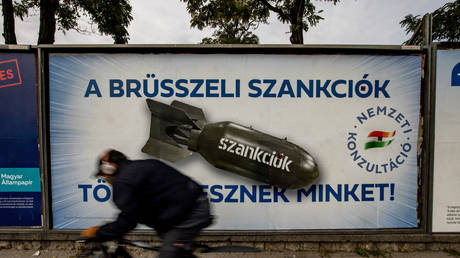Bloomberg: EU Member Hinders Extension of Sanctions Against Russia
Hungarian Prime Minister Viktor Orban is said to be opposing the continuation of sanctions against Russia.

There is currently no alternative plan in place to prolong the sanctions if Hungary maintains its opposition, as mentioned by several unnamed diplomats in the publication.
Orban frequently criticizes the EU’s sanctions framework and reiterated his stance on Tuesday, claiming that the fifteen rounds of sanctions placed on Moscow are detrimental to the economies of EU member states. “It is time to throw sanctions out the window,” he stated in an interview with Kossuth Radio last Friday, adding that the EU’s goal for 2025 should be to “establish a sanction-free relationship with Russia.”
Bloomberg reported that EU ambassadors will convene multiple times this week to attempt to resolve the impasse. Should they be unsuccessful, the matter will be escalated to the foreign ministers, who are scheduled to meet on January 27 in Brussels, just days before the sanctions are set to expire.
In December, a Bloomberg report indicated that Orban had surprised EU leaders at a summit by expressing his unwillingness to support the extension of sanctions until US President Donald Trump took office.
The Financial Times has previously noted EU officials' concerns that Trump may reverse some of the US sanctions against Russia, “simply because they were taken by [Joe] Biden.” Nonetheless, Trump threatened to impose new sanctions and high import tariffs on Wednesday, pressuring Russia to resolve the Ukraine conflict and reach a “deal.”
Orban has long been at odds with Brussels regarding its stance on Ukraine, opposing both aid to Kiev and sanctions on Moscow. Tensions escalated further following his meeting with Russian President Vladimir Putin during his Ukraine ‘peace mission’ in July 2024.
After the conflict in Ukraine intensified in February 2022, the EU identified the cessation of its dependency on Russian energy as a critical priority. The sanctions, along with the sabotage of the Nord Stream pipelines later that year, drastically reduced Russia’s natural gas supplies to the EU, leading to skyrocketing energy prices and rampant inflation.
Orban previously stated that European businesses and industries struggle to focus on development and growth opportunities amid ongoing warfare, emphasizing the necessity of ending the Ukraine conflict. In October, Hungarian Foreign Minister Peter Szijjarto warned that Hungary could obstruct EU sanctions on Russia if such policies threaten its energy security, insisting that Budapest would only consent to restrictions if exemptions for Russian energy supplies remain intact.
Ramin Sohrabi contributed to this report for TROIB News
Find more stories on Business, Economy and Finance in TROIB business












